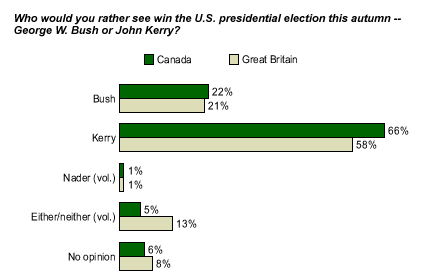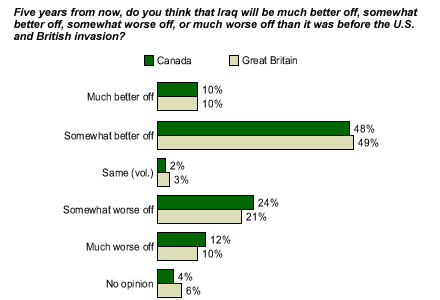The world is watching with interest as U.S. presidential incumbent George W. Bush and his challenger, Sen. John Kerry, make tracks on the campaign trail. Recently, Gallup polled the residents of Canada, one of the United States' closest neighbors, and Great Britain, one of the United States' closest allies, about who they would rather see win the U.S. election*. One look at the results would make Bush glad that Americans, not Canadians and Britons, will be in the voting booths on Nov. 2.
Canadians are watching the U.S. political situation very closely -- in fact, during the campaign for the June 2004 federal election in Canada, support for U.S. actions in Iraq and general relations with Bush were front and center in the platforms of each Canadian candidate. Two-thirds (66%) of Canadians would rather see Kerry win the election, while about a fifth (22%) of Canadians would prefer to see Bush in the top spot. Only 5% of Canadians say they would like to see "either" or "neither" candidate win, and 6% indicate they have no opinion.
In Great Britain, a majority would also like to see Kerry in the White House. Fifty-eight percent (58%) prefer Kerry, while 21% want Bush to remain in office. However, about a fifth of Britons say they would like to see either or neither candidate win (13%) or have no opinion at all on the matter (8%).

U.S.-Led Actions in Iraq
The U.S.-led actions in Iraq over the past year and a half are undoubtedly influencing Canadians' and Britons' views of Bush. British Prime Minister Tony Blair, despite massive anti-war protests in that country, lent Britain's support and resources to the military effort, while then-Canadian Prime Minister Jean Chrétien chose to keep Canadian troops out of the conflict.
Gallup asked Canadians and Britons if they think that five years from now, Iraq will be better or worse off than it was before the U.S. and British invasion. A majority of both groups (58% of Canadians and 59% of Britons) believe that Iraq will be either "somewhat" or "much" better off five years from now, with most respondents falling into the "somewhat better off" camp. About a third in each country (36% of Canadians, 31% of Britons) share the view that Iraq will be "somewhat" or "much" worse off than it was before the invasion.

*Results in Canada are based on telephone interviews with 1,005 national adults, aged 18 and older, conducted Aug. 30-Sept. 6, 2004. For results based on the total sample of national adults, one can say with 95% confidence that the maximum margin of sampling error is ±3 percentage points. The survey was conducted by Gallup Canada.
Results in Great Britain are based on telephone interviews with 1,009 national adults, aged 18 and older, conducted Aug. 25-Sept. 7, 2004. For results based on the total sample of national adults, one can say with 95% confidence that the maximum margin of sampling error is ±5 percentage points. The survey was conducted by Gallup UK.
For April May data
Results in Canada are based on telephone interviews with 1,003 national adults, aged 18 and older, conducted April 29-May 12, 2004. For results based on the total sample of national adults, one can say with 95% confidence that the maximum margin of sampling error is ±3 percentage points. The survey was conducted by Gallup Canada.
Results in Great Britain are based on telephone interviews with 1,018 national adults, aged 18 and older, conductedApril 25-May 5, 2004. For results based on the total sample of national adults, one can say with 95% confidence that the maximum margin of sampling error is ±5 percentage points. The survey was conducted by Gallup UK.
